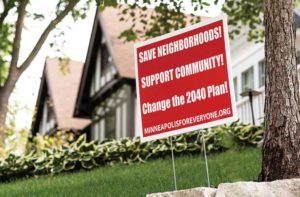Small Home Gazette, Winter 2019
Letter From the Editor: Bungalow Club speaks out about Minneapolis 2040 Comprehensive Plan
Remember when we were the good guys?
When the Twin Cities Bungalow Club began in 1995, we considered ourselves champions of the cities’ older neighborhoods. Instead of fleeing for the suburbs, we recognized that what were considered old, small, outdated houses were, in fact, architectural gems that contained peerless quality and unique charm. Through the years, grassroots advocacy turned the tide of public opinion. We invested in our homes, our blocks and our neighborhoods, and they became stronger.
Fast-forward to today, where some appear to see us as the enemy. For example, you may have seen the inflammatory remark about “bungalow neighborhoods” tweeted by one of our newly elected city councilmembers. See the Star Tribune article: “Minneapolis neighbors gather for latest chance to weigh in on 2040 Comprehensive Plan.” (Call me naïve, but I thought the elected officials of this great city were supposed to unite us, not divide us.)
So what happened? New Minneapolis leadership and the Minneapolis 2040 Comprehensive Plan are what happened.
In case you missed it, the Plan, recently adopted by the city, lays out priorities for the next two decades. The most controversial element of it allows for triplex housing units to be built (or created from existing buildings) anywhere in the city, on any lot. That includes our 40-foot-wide bungalow lots, and all the lots that hold mid-century moderns, Foursquares, Victorians, Cape Cods and every other house type.
 Needless to say, many homeowners are upset about the possible degradation of largely intact neighborhoods of single-family homes, and I don’t believe it’s because they fear those who may move in. They are concerned about loss of green space; parking congestion; and increased noise, traffic and pollution.
Needless to say, many homeowners are upset about the possible degradation of largely intact neighborhoods of single-family homes, and I don’t believe it’s because they fear those who may move in. They are concerned about loss of green space; parking congestion; and increased noise, traffic and pollution.
They are also concerned about loss of neighborhood character, for the lack of a better term. You may recall the outrage years ago when developers began bulldozing smaller, older homes in popular urban neighborhoods and replacing them with plasticky monster houses that loomed close to property lines and blotted out neighbors’ sunshine. It’s as if those responsible don’t understand they are destroying the very thing that originally made these neighborhoods desirable.
The most frustrating thing is that this aspect of the Plan is not based on careful research or long-established city planning methodology. It’s based on…well, not much that we can see. And Minneapolis is not the only city reeling from such developments. The text below is from a recent opinion piece, “Shattering Seattle’s Great Neighborhoods,” by the political cartoonist for The Seattle Times.
“In a perfect unfolding of the upzone scheme, there will be more affordable housing, more predictability for developers, and neighborhoods will get a little livelier—in a good way. If things go awry, however, as they often do with grand schemes concocted by city planners, the new housing will not really be as affordable as needed and developers will get richer even as the city’s cherished single-family neighborhoods get trashed.”
Proponents of the Minneapolis 2040 Plan intend it as a way to reduce racial disparities; increase access to affordable housing; reduce dependency on cars; and mitigate climate change, among other goals. Those aims are laudable, and they should be pursued. But that pursuit should not thoughtlessly risk the destruction of our neighborhoods—neighborhoods that made so many people want to live in Minneapolis in the first place.











